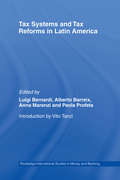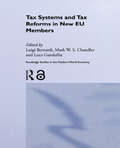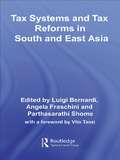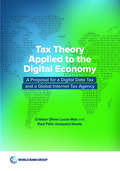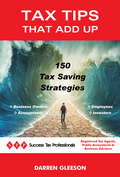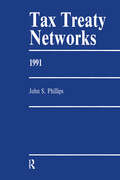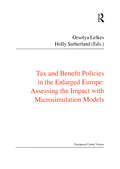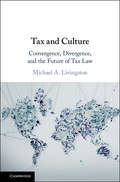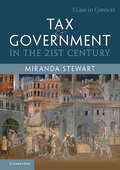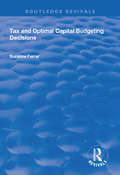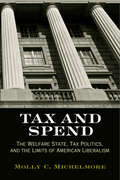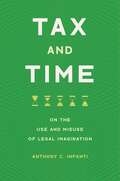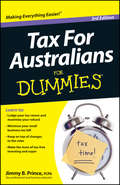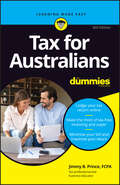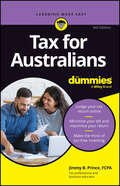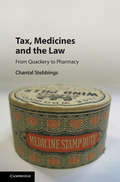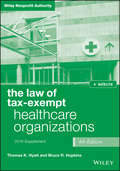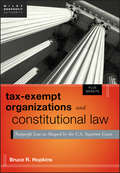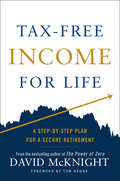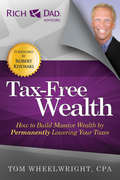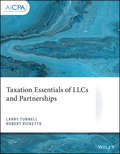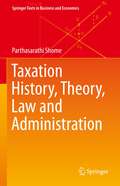- Table View
- List View
Tax Systems and Tax Reforms in Latin America (Routledge International Studies In Money And Banking Ser. #Vol. 45)
by Vito Tanzi Paola Profeta Luigi Bernardi Alberto Barreix Anna MarenziThis book provides a comprehensive analysis of tax systems and tax reforms in a number of Latin American countries since the early 1990‘s, including Argentina and Brazil, Costa Rica and Mexico, Paraguay, Colombia, Chile and Uruguay. The authors present and discuss tax systems from a broad quantitative and historical perspective and describe the mai
Tax Systems and Tax Reforms in New EU Member States (Routledge Studies in the Modern World Economy #Vol. 51)
by Luigi Bernardi Mark W. S. Chandler Luca GandulliaBuilding on the work carried out in the 2004 Routledge book, Tax Systems and Tax Reforms in Europe, an international team of contributors now turn their attention to the new EU member states. The book compares conditions in the new and potential EU Member states to those in the long-standing EU countries. Topics covered include: * A Comparative View of Taxation in the EU and in New Members * Tax Policy in EU New Members * Tax Policy in New Members under the Stability Pact * Tax Administration and the Black Economy. As well as investigating countries such as the Czech Republic, Estonia and the Baltics, Hungary, Poland and Slovenia, this outstanding book contains a foreword by Vito Tanzi and will be a valuable resource for postgraduates and professionals in the fields of economics, politics, finance and European studies.
Tax Systems and Tax Reforms in South and East Asia (Routledge International Studies in Money and Banking #Vol. 34)
by Parthasarathi Shome Luigi Bernardi Angela FraschiniThis book examines the present status, recent tax reforms and planned tax policies in some South and East Asia countries since the 1990s. The evidence is presented in a user friendly manner, but at the same time uses technically sophisticated methods. The main countries studied are China, India, Japan, Malaysia, South Korea and Thailand. It is unique for being the first systematic treatment of the topic: hitherto, the information available has been widely dispersed and difficult to access. It should prove to be a natural companion to two previous books on taxation published by Routledge and also edited by Luigi Bernardi.
Tax Theory Applied to the Digital Economy: A Proposal for a Digital Data Tax and a Global Internet Tax Agency
by Cristian Óliver Lucas-Mas Raúl Félix Junquera-VarelaDigital technology allows businesses to operate in a country without a physical presence, which poses challenges for traditional taxation. The digital debate focuses on direct taxation and the creation of new taxing rights arising from the tax claims of market jurisdictions on income obtained by foreign digital suppliers conducting business therein without any physical presence. Tax Theory Applied to the Digital Economy analyzes the tax-disruptive aspects of digital business models and reviews current tax initiatives in light of traditional tax theory principles. The analysis concludes that market countries’ tax claims are unsubstantiated and contravene the most basic foundations of tax theory, giving rise to a series of legal, economic, tax policy, and tax administration issues that policy makers cannot overlook. The authors propose establishing a digital data tax (DDT) that is a license-type consumption tax, rather than an income tax, on the international supply of Internet bandwidth to access digital markets. The DDT can be applied either globally or unilaterally, and could become a significant source of tax revenues for market jurisdictions. It is aligned with tax principles and it does not conflict with other tax initiatives: the DDT taxes foreign digital companies as consumers, while income tax proposals tax them as suppliers. The authors also propose creating a new global internet tax agency (GITA) under the auspices of the United Nations that would provide a neutral forum for political discussion and technical assistance in the area of digital taxation. The digital economy is a global phenomenon that requires a global solution: the creation of global taxing mechanisms and global institutions that provide technical assistance and support for successful global implementation. The book explains difficult technical concepts in plain language and contributes to the digital tax debate in a way that can be understood by anyone. Such understanding is essential to obtaining global support, achieving tax compliance, and fostering multilateral tax cooperation.
Tax Tips That Add Up: 150 Tax Saving Strategies
by Darren GleesonThis book details 150 tax saving strategies and ideas that if implemented will save you tax. It doesn't matter whether you are an employee, investor, or business owner; there are tax strategies that may apply to your circumstances. Often taxpayers, and even many accounting professionals, are unaware of all the tax saving strategies that are available. This is understandable really as the Australian taxation system is extremely complicated and ever changing. Up to date information is the key to ensuring you are not paying more tax than necessary. The focus of this book is to educate and enlighten taxpayers and professionals alike about 150 selected tax saving strategies that are legally available. Taxpayers should only pay the exact amount of tax they are legally required too and not a dollar more. How knowledgeable and 'switched on' is your accounting professional?
Tax Treaty Netowrks 1991
by John PhillipsFirst Published in 1991. The second edition of this book, using the formula adopted by its predecessor, sets out to do three things: first, it is a handy guide to the provisions of 58 tax treaties between 12 major trading nations; second, by comparing other treaties made by the countries concerned it helps to interpret the meaning of particular provisions; third, it may give the same help for treaties outside our list where, as often happens, the same or similar wording is used.
Tax and Benefit Policies in the Enlarged Europe: Assessing the Impact with Microsimulation Models (Public Policy and Social Welfare)
by Holly SutherlandThis book offers the first systematic assessment of income redistribution in Eastern Europe, within a comparative European perspective, and it demonstrates the future research potential of microsimulation techniques in this region. The book's chapters are based on a unique instrument -- EUROMOD: the European tax-benefit microsimulation model, which has been enlarged to include Estonia, Hungary, Poland, Slovenia and other countries. Tax-benefit models such as EUROMOD are computer programmes based on household micro-data, which calculate each household's disposable income. Microsimulation can be used to evaluate the impact of current taxes and benefit policies on individuals' incomes and work incentives. In addition, the model is designed to answer 'what if' questions about different policy reforms, allowing the potential effects of proposed changes to be studied before their actual implementation. EUROMOD goes one step further in the process of helping policy design, in allowing international comparisons between EU countries. This book offers an important demonstration of the effectiveness of tax-benefit models in presenting complex information in a concise and comprehensible way. It discusses what the barriers to their adoption to date have been and it looks at the possibilities EUROMOD offers to future policy-making in Europe.
Tax and Culture: Convergence, Divergence, and the Future of Tax Law
by Michael A. LivingstonTax scholars traditionally emphasize economics and assume that all tax systems can be evaluated in more or less the same way. By applying the insights of anthropology, sociology, and other social sciences, Michael A. Livingston demonstrates that tax systems frequently pursue different values and that the convergence of tax systems is frequently overstated. In Tax and Culture, he applies these insights to specific countries, such as China and India, and specific tax issues, including progressivity, tax avoidance, and the emerging area of environmental taxation. Livingston concludes that the concept of a global tax culture is, in many cases, merely a reflection of Western hegemony, and is unlikely to survive the changes implicit in the rise of non-Western nations and cultures.
Tax and Government in the 21st Century (Law in Context)
by Miranda StewartWith an accessible style and clear structure, Miranda Stewart explains how taxation finances government in the twenty-first century, exploring tax law in its historical, economic, and social context. Today, democratic tax states face an array of challenges, including the changing nature of work, the digitalisation and globalisation of the economy, and rebuilding after the fiscal crisis of the COVID-19 pandemic. Stewart demonstrates the centrality of taxation for government budgets and explains key tax principles of equity, efficiency and administration. Presenting examples from a wide range of jurisdictions and international developments, Stewart shows how tax policy and law operate in our everyday lives, ranging from family and working life to taxing multinational enterprises in the global digital economy. Employing an interdisciplinary approach to the history and future of taxation law and policy, this is a valuable resource for legal scholars, practitioners and policy makers.
Tax and Optimal Capital Budgeting Decisions (Routledge Revivals)
by Suzanne FarrarFirst published in 1999, this volume responds to the system of corporate taxation in the UK and aims to develop mathematical programming models which determine the optimum combination of investment decisions and financing methods for capital budgeting on a post-tax basis, incorporating specific important areas not previously examined in the literature. Suzanne Farrar also aims to achieve operational experience of these models, in order to gain insights into the impact of taxation on project appraisal in complex situations where several potentially distorting tax effects operate simultaneously, and the general practical feasibility of operational use. Beginning with capital investment and the UK Corporate Tax System, Farrar moves onto capital investment appraisal, tax and optimal financing, optimisation models in capital budgeting, the mathematical programming model and operational use of that model.
Tax and Pension Reform in the Czech Republic--Implications for Growth and Debt Sustainability
by Anita Tuladhar Dennis BotmanA report from the International Monetary Fund.
Tax and Spend
by Molly C. MichelmoreTaxes dominate contemporary American politics. Yet while many rail against big government, few Americans are prepared to give up the benefits they receive from the state. In Tax and Spend, historian Molly C. Michelmore examines an unexpected source of this contradiction and shows why many Americans have come to hate government but continue to demand the security it provides.Tracing the development of taxing and spending policy over the course of the twentieth century, Michelmore uncovers the origins of today's antitax and antigovernment politics in choices made by liberal state builders in the 1930s, 1940s, and 1950s. By focusing on two key instruments of twentieth-century economic and social policy, Aid to Families with Dependent Children and the federal income tax, Tax and Spend explains the antitax logic that has guided liberal policy makers since the earliest days of Franklin Roosevelt's presidency. Grounded in careful archival research, this book reveals that the liberal social compact forged during the New Deal, World War II, and the postwar years included not only generous social benefits for the middle class--including Social Security, Medicare, and a host of expensive but hidden state subsidies--but also a commitment to preserve low taxes for the majority of American taxpayers.In a surprising twist on conventional political history, Michelmore's analysis links postwar liberalism directly to the rise of the Republican right in the last decades of the twentieth century. Liberals' decision to reconcile public demand for low taxes and generous social benefits by relying on hidden sources of revenues and invisible kinds of public subsidy, combined with their persistent defense of taxpayer rights and suspicion of "tax eaters" on the welfare rolls, not only fueled but helped create the contours of antistate politics at the core of the Reagan Revolution.
Tax and Time: On the Use and Misuse of Legal Imagination
by Anthony C. InfantiHow tax law perpetuates injustice but might instead be used as a powerful force for creating a more just and equitable society The relationship between tax law and society, Anthony C. Infanti asserts, is too often overlooked by those who work outside of the field of fiscal policy. Yet, the way a country collects and spends its revenue can be viewed as a quantifiable reflection of how a country sees itself, sending messages about both what it values now and what it aspires to be in the future.Tax and Time sheds light on two of the most misunderstood universal human experiences: time and taxes. Anthony C. Infanti asserts that time in tax law is the product of pure imagination and calls into question the world beyond time that we have created for ourselves. Written with clarity and powerful insight, Tax and Time demonstrates how the tax laws have been used to imaginatively manipulate time in ways that perpetuate economic and social injustice. With its social justice focus, the book brings a sorely needed critical perspective to technical tax policy discussions. Infanti calls for a systematic reexamination and reworking of the relationship between time and tax law, asserting that the power of the legal imagination to manipulate time in tax law can both correct past injustices and help us to envision—and actually work toward—a better and more just society.
Tax for Australians For Dummies
by Jimmy B. PrinceTake on your tax with confidence and get the most out of your next tax return Do you want to be sure you're getting the maximum tax refund? Of course you do! And Tax For Australians for Dummies, Third Edition is the only resource you need to ensure that you get every cent you deserve. Written by respected tax specialist and CPA fellow Jimmy B. Prince, this book guides you, step by step, through the labyrinthine world of the Australian tax system to help you understand exactly what you can claim. Providing complete coverage of changes to tax legislation for the 2011/12 tax year, including the recently passed climate change tax legislation, as well as proposed changes that haven't quite made into law yet, the book has you covered from every angle. Designed to help you take advantage of everything from investments to kids to government concessions, Tax For Australians for Dummies tells you everything you need to know to beat the taxman at his own game. Designed specifically for Australians Includes everything you need to build your tax knowledge Contains essential new information on claiming home office, work car, and self-education expenses and uses case studies to illustrate your opportunities to save Whether you're an employee, investor, small business owner, retiree, or student, Tax For Australians for Dummies, Third Edition is the easy-to-follow guide that answers all your tax questions.
Tax for Australians For Dummies (For Dummies Ser.)
by Jimmy B. PrinceTackle your taxes—and get the most from your next tax return! Do you want to be sure you&’re getting the maximum tax refund? Of course you do! Luckily, Tax for Australians For Dummies is here to make it easy to get every cent you deserve for the new tax year. Written by respected tax specialist and CPA fellow Jimmy B. Prince, this fun and friendly guide walks you step-by-step through the complex Australian tax system. It explains, in plain English, exactly what you can claim and exactly what you&’re owed. Designed to help you take advantage of everything from investments to kids to government concessions, Tax for Australians For Dummies has you covered from every angle. With plenty of top tips, plus warnings to help you avoid common pitfalls, you&’ll find filing your tax return a breeze. And your taxes will be up to date with the latest changes thanks to this new and fully revised 8th edition. Whether you prepare your own tax return online or go to an accountant, there&’s something inside that will take your return from &‘What?&’ to &‘Wow!&’ in no time. Includes updated tax rates and superannuation thresholds Explains Fringe Benefits Tax and Capital Gains Tax Covers tax and financial hardship and relief measures Unpacks what you need to know about small business deductions If you&’re an employee, investor, small business owner, retiree or even a student, Tax for Australians For Dummies is the no-nonsense, easy-to-follow guide that answers all of your tax questions.
Tax for Australians For Dummies (For Dummies Ser.)
by Jimmy B. PrinceTackle your taxes with ease – and get the most from your next return! Do you want to be sure you're getting the maximum tax refund? Of course you do! Luckily, Tax for Australians For Dummies makes it easy to ensure you get every cent you deserve. Written by respected tax specialist and CPA fellow Jimmy B. Prince, this fun and friendly guide walks you step-by-step through the complex Australian tax system. It explains in plain English what you can claim — and exactly what you're owed. Tax for Australians For Dummies has you covered from every angle: from family tax benefits to electric cars, superannuation tax thresholds to working-from-home deductions, personal investments to business concessions, and much more. Full of top tips and quick facts, this new and revised 9th edition will ensure you’re up to date with the latest tax changes. Whether you prepare your tax return online or go to an accountant, you’ll find something inside that will take your return from “What?” to “Wow!” in no time. Includes up-to-date tax rates and superannuation thresholds Explains Fringe Benefits Tax and Capital Gains Tax Covers tax and financial hardship and relief measures If you’re an employee, investor, small-business owner, retiree or even a student, Tax for Australians For Dummies is the no-nonsense, easy-to-follow guide that answers all of your tax questions.
Tax, Medicines and the Law: From Quackery to Pharmacy
by Chantal StebbingsIn 1783, a stamp duty was imposed on proprietary or 'quack' medicines. These largely useless but often dangerous remedies were immensely popular. The tax, which lasted until 1941, was imposed to raise revenue. It failed in its incidental regulatory purpose, had a negative effect in that the stamp was perceived as a guarantee of quality, and had a positive effect in encouraging disclosure of the formula. The book explains the considerable impact the tax had on chemists and druggists - how it led to an improvement in professional status, but undermined it by reinforcing their reputations as traders. The legislation imposing the tax was complex, ambiguous and never reformed. The tax authorities had to administer it, and executive practice came to dominate it. A minor, specialised, low-yield tax is shown to be of real significance in the pharmaceutical context, and of exceptional importance as a model revealing the wider impact of tax law and administration.
Tax, Welfare, and Pension Reforms in Slovenia: Implications for Work Incentives and Labor Participation
by Anita Tuladhar Philippe Egoumé-BossogoA report from the International Monetary Fund.
Tax-Exempt Healthcare 2016 Supplement
by Thomas K. HyattGet up to date on 2016 healthcare law and newly relevant issues The Law of Tax-Exempt Healthcare Organizations 2016 Supplement provides complete and comprehensive practitioner updates and analysis in a single volume. Tackling complex legal issues with plain-English explanations and the appropriate citations, this guide is a must-have resource for organizations and their advisors. This new supplement to the Fourth Edition has been fully updated with the latest IRS guidance and requirements, and expanded with additional coverage of relevant topics. The new discussion includes healthcare reform and the Affordable Care Act, the fiduciary duty of directors on the governing body of nonprofit organizations, executive compensation, activities of tax-exempt organizations that appear more commercial than charitable, political campaign activity, charitable reforms, restrictions on supporting organizations, intermediate sanctions, and much more. The companion website provides extensive appendices for further reference, as well as helpful downloadable tables that facilitate a more efficient approach to practice. Healthcare law is a complex field, and keeping up with the frequent changes to federal law is itself a full time job. This book eliminates the need for extended research time by collecting all of the newest and relevant guidelines into one place. Get up to date on the latest IRS forms, guidance, and procedures Interpret complex legal issues correctly and appropriately Reference relevant federal guidelines quickly and easily Access extensive appendices and tables to streamline application As the field evolves and new issues arise, practitioners need a working knowledge of the legal implications behind organizational activities, structure, practices, and more. This most recent annual supplement to The Law of Tax-Exempt Healthcare Organizations is a must-have resource for anyone in the field.
Tax-Exempt Organizations and Constitutional Law
by Bruce R. HopkinsA comprehensive guide to understanding the theory and implications of constitutional law as it relates to tax-exempt organizationsAlthough the U.S. Constitution does not make any reference to nonprofit organizations--not surprising, since the Constitution is not a framework for the structure of the entirety of U.S. society--the Supreme Court has effusively shaped nonprofit law. Now, leading nonprofit law expert Bruce R. Hopkins discusses how tax-exempt organizations, including educational, religious, and healthcare institutions, are directly affected by constitutional law decisions and other pronouncements from the U.S. Supreme Court.Written by one of the country's leading legal authorities on tax-exempt organizationsProvides a comprehensive, authoritative examination of constitutional law principles and their implications for tax-exempt organizationsIncludes coverage of the Supreme Court's perspective on nonprofit organizations and tax exemption, applicability of the Establishment and Free Exercise Clauses to nonprofit religious organizations, the import of Free Speech principles in the charitable fundraising context, the constitutionality of the individual health insurance mandate, and moreOther titles by Bruce R. Hopkins: The Law of Tax-Exempt Organizations, Tenth Edition, The Law of Fundraising, Fourth Edition, and The Tax Law of Charitable Giving, Fourth EditionShould religious organizations be exempt from taxation? Should religious groups get tax exemptions not available to other organizations? Are state charitable solicitation acts constitutional? Is the health insurance mandate constitutional? Is the Affordable Care Act subject to legal challenge at this time? How many ways has the Supreme Court shaped nonprofit law? Get answers to these questions and many more from Tax-Exempt Organizations and Constitutional Law.
Tax-Free Income for Life: A Step-by-Step Plan for a Secure Retirement
by David McKnightThe follow-up to the bestselling The Power of Zero, providing a blueprint to build a guaranteed, tax-free income stream that lasts for the long run. American retirees face a looming crisis. We are living longer than ever before, and most experts predict a dramatic rise in tax rates within the next ten years. The hard truth is that no matter how much you save, you are likely to outlive your money or watch it be taxed into oblivion. But when traditional retirement distribution strategies won't provide sufficient income in the face of higher taxes, what can you do?Tax-Free Income for Life lays out a comprehensive, step-by-step roadmap for a secure retirement. McKnight shows how the combination of guaranteed, inflation-adjusted lifetime income and a proactive asset-shifting strategy can shield you from longevity risk and the cascade of unintended consequences that result from higher taxes. It's an innovative and proven strategy that maximizes return while effectively neutralizing the two biggest risks to retirement savings. If ever there were a solution for the American retiree, it's guaranteed tax-free income for life.
Tax-Free Wealth
by Tom WheelwrightTax-Free Wealth is about tax planning concepts. It's about how to use your country's tax laws to your benefit. In this book, Tom Wheelwright will tell you how the tax laws work. And how they are designed to reduce your taxes, not to increase your taxes. Once you understand this basic principle, you no longer need to be afraid of the tax laws. They are there to help you and your business-not to hinder you.Once you understand the basic principles of tax reduction, you can begin, immediately, reducing your taxes. Eventually, you may even be able to legally eliminate your income taxes and drastically reduce your other taxes. Once you do that, you can live a life of Tax-Free Wealth.
Tax-Motivated Film Financing at Rexford Studios
by Mihir A. Desai Mark F. Veblen Gabriel J. LoebThe head of production for Rexford Studios must analyze the terms and value consequences of an international financing involving a German film fund. The financing involves a sale-leaseback structure where international tax rules give rise to a sizable economic pie that is divided up among the fund investors, the studio, and the arrangers. To conduct the negotiation, the producer must value the cash flow streams to each of the parties and recognize the nature of the tax arbitrage in the context of his overall financing needs. As a consequence, the major issues involved in film financing and the nature of sale-leaseback transactions driven by tax considerations are explored, as is the competition between countries for film production. Finally, the underlying determinants of opportunities created by international tax rules are valued. To obtain executable spreadsheets (courseware), please contact our customer service department at custserv@hbsp.harvard.edu.
Taxation Essentials of LLCs and Partnerships (AICPA)
by Larry Tunnell Robert RickettsThis book helps addresses the tax consequences of the most common transactions engaged in by limited liability corporations (LLCs)and partnerships. You will develop a level of comfort with the basic conceptual framework underlying partnership and LLC taxation, as well as gain an explanation of the tax consequences associated with issues most frequently confronted by tax practitioners. Topics covered include: basic tax structure of partnerships and LLCs; electing to be taxed as a partnership: "check-the-box" rules; tax consequences of partnership or LLC formation; partnership distributions; compensatory payments to partners; at-risk and passive activity limits; profit and loss allocations: general rules and restrictions; and reporting taxable income for partnerships and LLCs.
Taxation History, Theory, Law and Administration (Springer Texts in Business and Economics)
by Parthasarathi ShomeTax practitioners are unfamiliar with tax theory. Tax economists remain unfamiliar with tax law and tax administration. Most textbooks relate mainly to the US, UK or European experiences. Students in emerging economies remain unfamiliar with their own taxation history. This textbook fills those gaps. It covers the concept of taxes in regards to their rationale, principles, design, and common errors. It addresses distortions in consumer choices and production decisions caused by tax and redressals. The main principles of taxation—efficiency, equity, stabilization, revenue productivity, administrative feasibility, international neutrality—are presented and discussed. The efficiency principle requires the minimisation of distortions in the market caused by tax. Equity in taxation is another principle that is maintained through progressivity in the tax structure. Similarly, other principles have their own ramifications that are also addressed. A country’s constitutional specification of tax assignment to different levels of government—central, state, municipal—are elaborated. The UK is more centralised than the US and India. India has amended its constitution to introduce a goods and services tax (GST) covering both central and state governments. Drafting of tax law is crucial for clarity and this aspect is addressed. Furthermore, the author illustrates different types of taxes such as individual income tax, corporate income tax, wealth tax, retail sales/value added/goods and services tax, selective excises, property tax, minimum taxes such as the minimum alternate tax (MAT), cash-flow tax, financial transactions tax, fringe benefits tax, customs duties and export taxes, environment tax and global carbon tax, and user charges. An emerging concern regarding the inadequacy of international taxation of multinational corporations is covered in some detail. Structural aspects of tax administration are given particular attention.
